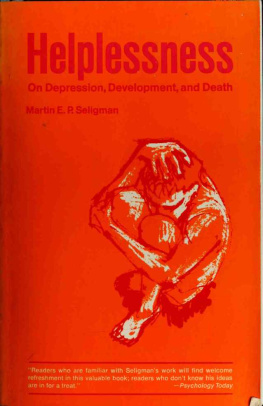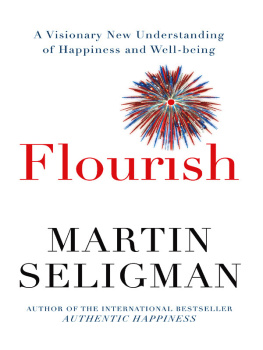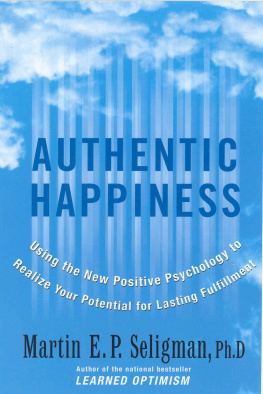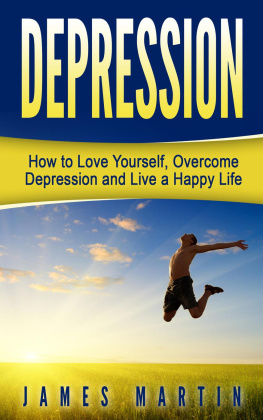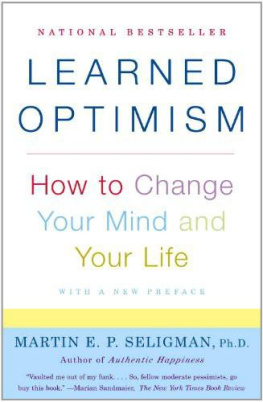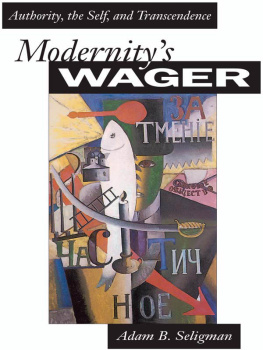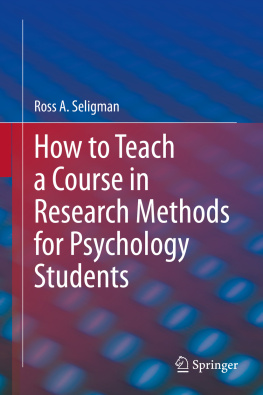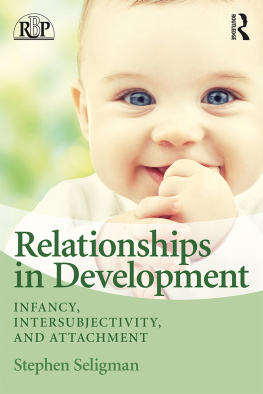Martin E. P. Seligman - Helplessness. on depression, development, and death
Here you can read online Martin E. P. Seligman - Helplessness. on depression, development, and death full text of the book (entire story) in english for free. Download pdf and epub, get meaning, cover and reviews about this ebook. City: San Francisco; New York, year: 1975, publisher: W. H. Freeman, genre: Romance novel. Description of the work, (preface) as well as reviews are available. Best literature library LitArk.com created for fans of good reading and offers a wide selection of genres:
Romance novel
Science fiction
Adventure
Detective
Science
History
Home and family
Prose
Art
Politics
Computer
Non-fiction
Religion
Business
Children
Humor
Choose a favorite category and find really read worthwhile books. Enjoy immersion in the world of imagination, feel the emotions of the characters or learn something new for yourself, make an fascinating discovery.
- Book:Helplessness. on depression, development, and death
- Author:
- Publisher:W. H. Freeman
- Genre:
- Year:1975
- City:San Francisco; New York
- Rating:5 / 5
- Favourites:Add to favourites
- Your mark:
- 100
- 1
- 2
- 3
- 4
- 5
Helplessness. on depression, development, and death: summary, description and annotation
We offer to read an annotation, description, summary or preface (depends on what the author of the book "Helplessness. on depression, development, and death" wrote himself). If you haven't found the necessary information about the book — write in the comments, we will try to find it.
Helplessness. on depression, development, and death — read online for free the complete book (whole text) full work
Below is the text of the book, divided by pages. System saving the place of the last page read, allows you to conveniently read the book "Helplessness. on depression, development, and death" online for free, without having to search again every time where you left off. Put a bookmark, and you can go to the page where you finished reading at any time.
Font size:
Interval:
Bookmark:
Digitized by the Internet Archive in 2011 http://www.archive.org/details/helplessnessondeOOseli
HELPLESSNESS
A series of books in psychology
Editors :
Richard C. Atkinson Jonathan Freedman Gardner Lindzey Richard F. Thompson
ON DEPRESSION, DEVELOPMENT, AND DEATH
MARTIN E. P. SELIGMAN
University of Pennsylvania
W. H. FREEMAN AND COMPANY SAN FRANCISCO
Library of Congress Cataloging in Publication Data Seligman, Martin E P Helplessness.
Bibliography : p.
Includes indexes.
I. Helplessness (Psychology) 2. Depression, Mental. I. Title.
BF575.H4S44 616.8*528 74-23125
ISBN 0-7167-0752-7 ISBN 0-7167-0751-9 pbk.
Copyright 1975 by Martin E. P. Seligman
No part of this book may be reproduced by any mechanical, photographic, or electronic process, or in the form of a phonographic recording, nor may it be stored in a retrieval system, transmitted, or otherwise copied for public or private use, without written permission from the publisher.
Printed in the United States of America
Excerpt from When the Watchman Saw the Light," p. 96, translated by Edmund Keeley and George Savidis in . P. Cavafy, Passions and Ancient Days . Copyright 1971 by the Dial Press.
Excerpt from Do Not Go Gentle into That Good Night," p. 188, copyright 1952 by Dylan Thomas. Reprinted by permission of New Directions Publishing Corporation and J. M. Dent & Sons Ltd.
Dedicated to my father, Adrian Seligman (1906-1972), who knew well the struggle against helplessness.
CHAPTER THREE
Stomach Ulcers | |
Preference for Predictability | |
The Relationship of Predictability to Controllability | I23 |
Self-administration | I25 |
Perceived control | I27 |
Systematic Desensitization and Uncontrollability | I29 |
Conclusion | I32 |
CHAPTER SEVEN EMOTIONAL DEVELOPMENT | |
AND EDUCATION | U4 |
The Dance of Development | |
Reajference | |
Maternal Deprivation | |
Predictability and Controllability in Childhood | |
and Adolescence | |
The classroom | |
Poverty | *59 |
CHAPTER EIGHT | |
DEATH | l66 |
Death from Helplessness in Animals | I69 |
Death from Helplessness in Humans | US |
Institutionalised helplessness | l8l |
Death from helplessness in old age | |
Infant death and anaclitic depression | |
Conclusion | |
NOTES | |
BIBLIOGRAPHY | |
NAME INDEX | |
SUBJECT INDEX |
CONTENTS / X
People become involved in psychology for various reasons. Some people are fascinated by the elegance of a simple system, some by the habits of a particular species, and some by the awesome possibility of controlling what other men shall do. I have made psychology my life's work in order to better understand one speciesman.
This is an unfashionable thing for a learning theorist and comparative psychologist to admit; nevertheless it is true. Although I have spent much of my time working with species other than man and thinking about simple processes, I am also a clinical psychologist who has observed other human beings and interacted with them, both in experimental and in therapeutic settings. These two faces of-my workthe experimental and the clinicalare intimately related, for I believe
that an understanding of other species and of simple processes is relevant to the understanding of complex processes in man. More than relevantessential. That is one way of saying what this book is about. It is an attempt to analyze human helplessness, in its many aspects, by applying theory and relevant knowledge from the laboratory.
For seventy-five years experimental psychologists, from the isolation of their laboratories, have written many promissory notes. These promissory notes claimed that an understanding of simple processes, lower species, and highly controlled experimental situations would shed light on real problems, in particular, human psychopathology. What follows is my attempt to begin to pay off what is owed.
Since much of the subject matter of this book derives from experimentation, I must say a few words about ethics. Many of the experiments I shall describe may seem cruel, particularly to the non-scientist: pigeons are deprived of food, dogs are shocked, rats are plunged into cold water, infant monkeys are deprived of their mothers, and all experimental animals are deprived of their freedom by confinement to cages. Are such manipulations ethically justifiable? To my mind they are by and large not only justifiable, but, for scientists whose basic commitment is to the alleviation of human misery, not to do them would be unjustifiable. In my opinion, each scientist must ask himself one question before doing any experiment on an animal: Is it likely that the pain and deprivation that this animal is about to endure will be greatly outweighed by the resulting alleviation of human pain and deprivation? If the answer is yes, the experiment is justified.
Anyone who has spent time with severely depressed patients or with schizophrenic adults can appreciate the degree of their misery; to argue, as some do, that people should not do experiments on animals, is to ignore the misery of their fellow human beings. Not to do such research is to consign
millions of humans to continued misery. Most human beings, as well as household pets, are alive today because animal experiments with medical ends were carried out; without such studies, polio would still be rampant, smallpox widespread and almost always fatal, and phobias incurable. As for the studies discussed in this book, I believe that what we have learned about depression, anxiety, sudden death, and their cure and prevention justifies the animal experiments that have led us to these insights.
This book has been ten years in the making. A large number of people have contributed to it by collaborating with me in experiments, by brainstorming sessions, by teaching and advice, and by general sustenance. The easiest way to thank them is in chronological order.
From 1964 to 1967 I was a National Science Foundation graduate fellow in the Department of Psychology at the University of Pennsylvania. Richard L. Solomon and J. Bruce Overmier first interested me in the phenomenon of helplessness; Bruce collaborated with Russell Leaf on the first experiments and worked with me in my first year, and his last, of graduate school. During that year Steven F. Maier and I began three years of working together on helplessness; we performed our first studies that were self-consciously about helplessness and formulated the rudiments of the theory presented in this book. James Geer collaborated with Steve and me on therapy for helplessness. During those three years so many people taught us, read our manuscripts, and gave us advice that I fear I have forgotten some. Among them were Francis Irwin, Robert Rescorla, J. Brooks Carder, Henry Gleitman, Vincent Lo-Lordo, Frank Norman, Joseph Wolpe, Arnold Lazarus, Jack Catlin, Lynn Hammond, David Williams, Morris Viteles, Nicholas MacKintosh, Elijah Lovejoy, Phillip Teitelbaum, Larry Stein, J. Paul Brady, Julius Wishner, Martin Orne, Peter
Next pageFont size:
Interval:
Bookmark:
Similar books «Helplessness. on depression, development, and death»
Look at similar books to Helplessness. on depression, development, and death. We have selected literature similar in name and meaning in the hope of providing readers with more options to find new, interesting, not yet read works.
Discussion, reviews of the book Helplessness. on depression, development, and death and just readers' own opinions. Leave your comments, write what you think about the work, its meaning or the main characters. Specify what exactly you liked and what you didn't like, and why you think so.

